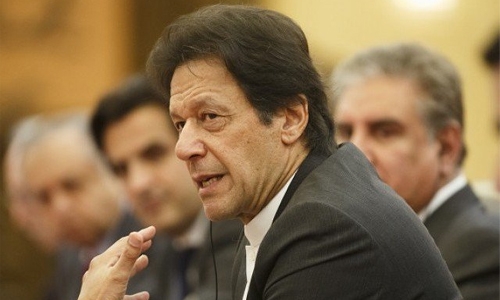Can Imran Khan tackle extremist elements?
After spending eight years on death row, Asia Bibi, a Christian, was acquitted by Pakistan’s Supreme Court this week. Posters were put up with fatwas against the judges who had issued the Bibi decision. The judges’ guards and cooks were urged to kill them before evening; anyone who did would earn great rewards in the afterlife. Pakistani conservatives, emboldened by gains in the general election this summer, goaded the generals into rebelling against the army chief, whom they accused of being an Ahmadi, a persecuted religious minority.
They called Prime Minister Imran Khan a “Jew child.” Khan, in an impromptu address to the nation, seemed appalled at the language and the implication: He said his government had already done more than any other for Islam and warned protesters not to take on the state. But the mobs will settle for nothing short of Bibi’s public hanging. Bibi probably didn’t even know what blasphemy was when she was accused of committing it. There are many versions of what led to the charges against her, but all revolve around a verbal altercation with Muslim neighbours in Punjab, an eastern province, about drinking water from the same vessel.
Some Muslims won’t share utensils with non-Muslims, a belief that has more to do with (Hindu) casteism than (Islamic) scripture. We can never know what she may or may not have said because repeating blasphemy is also blasphemy, and writing it down may be even greater blasphemy. So let’s not go there. We do know what happened next. Bibi was convicted of blasphemy in 2010 and, after what her lawyers called a forced confession, was sentenced to death by one court. Another court later confirmed the sentence.
The governor of Punjab province, Salman Taseer, visited her in prison and promised to lobby for a presidential pardon. He was assassinated by one of his police bodyguards who believed the governor had committed blasphemy by questioning the country’s blasphemy laws. The Pakistani media was understanding. Of the bodyguard’s feelings. A federal minister who happened to be Christian and spoke up for Bibi also was assassinated. Although nobody has actually been hanged by the state for blasphemy so far, the mere accusation can be an open invitation to kill the accused.
Last year, the university student Mashal Khan was lynched by classmates after he was accused of putting some blasphemous posts on social media. They were nothing more than a campus rebel’s personal thoughts, some revolutionary poetry and musings about the meaning of life. Also last year, five bloggers were picked up by intelligence agencies in what seemed like coordinated raids. They had all written against the army or its security policies. Some had written in prose, some in poetry; others in Facebook rants. As their disappearance lasted, some people on social media and TV anchors close to the army started accusing them of having committed blasphemy.
They were eventually released by their abductors, but so much poison had been spread about them that they had to leave the country. Ahead of the last election the same people who are now demanding the army chief ’s head laid siege to the capital. They were protesting against the government for changing one word in the oath that you are required to take as a member of parliament. This blasphemy brigade was egged on by the media and opposition political parties. Khan, who was the opposition leader at the time, said that his followers were rearing to join the protest.
Gen Qamar Javed Bajwa, the army’s top commander, said publicly that it couldn’t be expected to use force against its own people, an honourable sentiment with little precedent in Pakistan’s history. After a botched police operation, the army triumphantly negotiated with the protesters, and an agreement was signed conceding many of their demands. The law minister was fired. The word change in the law was changed back. A general was seen distributing 1,000-rupee notes to demonstrators and patting them on the back: Are we not with you? Aren’t we all part of the same brotherhood? Now those brothers have returned to bite our military and civilian establishment.
An arm around the shoulder and some petty cash may be a good lawand-order strategy in some potentially explosive situations. It’s almost certain that Bibi will not be able to live in the country after her acquittal. And a lot of people like her are still languishing in cells waiting to be tried. There’s a literature professor, Junaid Hafeez, who has been in jail for the last five years facing bogus blasphemy charges. After he was arrested, his lawyer was shot dead for defending him. His current lawyer can’t be named. Hafeez has to be kept in solitary confinement to protect him from other prisoners.
Now that the prime minister himself is in the righteous’s sight — protecting a blasphemer may be even graver blasphemy — and a man even more powerful than him, Bajwa, has been declared kafir, an infidel, one can only hope their respective institutions won’t use the blasphemy card against their perceived enemies. There were about a dozen reported cases of blasphemy between 1927 and 1986, but there have been more than 4,000 since then, when the laws were reinforced. Pakistani liberals are asking the government and the army to go and crush the religious extremists and take the country back. It might be more useful to go after these blasphemy laws that seem to be many people into blasphemers.
Related Posts

